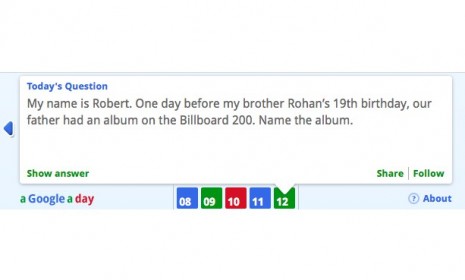A Google a Day: The trivia game that encourages cheating
It's considered unsportsmanlike to find the answers to quizzes and puzzles using search engines, but that's not the case with a new challenge launched by Google itself

A free daily email with the biggest news stories of the day – and the best features from TheWeek.com
You are now subscribed
Your newsletter sign-up was successful
Hardcore trivia geeks and puzzle solvers usually frown on anyone who searches the Web for answers, but this week Google introduced a daily one-question brain teaser that promotes reliance on the company's search engine. Here, a guide:
What is this new trivia game?
It's called A Google a Day. Each day, the site supplies a new question so tricky that a routine Google search won't turn up the solution, says Doug Gross at CNN. On weekdays, the puzzles will also be printed in The New York Times, alongside the crossword puzzle. Today's clue, for example, is, "My name is Robert. One day before my brother Rohan's 19th birthday, our father had an album on the Billboard 200. Name the album." (We won't give you the answer here.) Much like the Times crossword, the puzzles will increase with difficulty as the week goes on.
The Week
Escape your echo chamber. Get the facts behind the news, plus analysis from multiple perspectives.

Sign up for The Week's Free Newsletters
From our morning news briefing to a weekly Good News Newsletter, get the best of The Week delivered directly to your inbox.
From our morning news briefing to a weekly Good News Newsletter, get the best of The Week delivered directly to your inbox.
Is cheating really encouraged?
To a point. The idea is to promote strategic Googling, and the search giant has built in social elements, allowing stumped users to ask their friends for help via e-mail, Buzz, Facebook and Twitter. But the trivia site itself, which otherwise resembles Google's main page, eliminates spoilers by suppressing posts revealing the correct answers. The puzzle search is powered by what the company calls Deja Google, a "wormhole inspired time machine that enables you to solve today's puzzle spoiler free by searching the internet as it existed before 'A Google a Day' was launched."
Why is Google getting into trivia?
"Over time, Google has realized that people aren’t using Google to its full potential," says Ken Denmead at Wired. "Like taking your Lamborghini Miura to the corner store to pick up a lottery ticket, folks haven’t been truly putting the search engine through its paces." Google itself confirms this: "We hope A Google a Day triggers your imagination and helps you discover all the types of questions you can ask Google—and get an answer," says Dan Russell, a Google user experience researcher, on the company's official blog.
A free daily email with the biggest news stories of the day – and the best features from TheWeek.com
So is this just a marketing gimmick?
Well, "either this is some seriously weak-sauce PR, or Google is positioning itself as the puzzle arbiter of the next generation," says Kit Eaton at Fast Company. But the game may backfire, says Jared Newman at PCWorld, and expose "a weakness in traditional search." As the battle between IBM's Watson and human "Jeopardy!" champions revealed, someday all computers may be able to answer "complex trivia questions such as the ones Google is asking," rendering keyword searches obsolete. For now, though, the site is "fun and doesn't take too much time (if you're an avid searcher)," says Whitney Matheson at USA Today.
Sources: CNN, Wired, Google Blog, Fast Company, PCWorld, USA Today
-
 The ‘ravenous’ demand for Cornish minerals
The ‘ravenous’ demand for Cornish mineralsUnder the Radar Growing need for critical minerals to power tech has intensified ‘appetite’ for lithium, which could be a ‘huge boon’ for local economy
-
 Why are election experts taking Trump’s midterm threats seriously?
Why are election experts taking Trump’s midterm threats seriously?IN THE SPOTLIGHT As the president muses about polling place deployments and a centralized electoral system aimed at one-party control, lawmakers are taking this administration at its word
-
 ‘Restaurateurs have become millionaires’
‘Restaurateurs have become millionaires’Instant Opinion Opinion, comment and editorials of the day